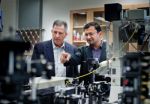(Press-News.org) A web-based study of 994 men and women with chronic migraine found that the condition significantly impacts family relationships and activities, including cancelled vacation plans and reduced quality time with partners and children. Feelings of guilt, anger and annoyance toward family members due to headache, and avoidance of sexual intimacy due to headache also were reported. Chronic migraine is generally defined as migraine with headaches occurring 15 or more days per month.
The Family Burden of Chronic Migraine to the Migraineur: Results of the CaMEO (Chronic Migraine Epidemiology & Outcomes) Study was reported at the 56th Annual Scientific Meeting of the American Headache Society. The study's purpose was to measure the perceived nature and extent of chronic migraine-related burden on family relationships and activities. The lead author of the study was Dawn C. Buse, Ph.D., director, Behavioral Medicine, Montefiore Headache Center and associate professor, Clinical Neurology, Albert Einstein College of Medicine.
"This study highlights the significant impact of chronic migraine, not only on the person with migraine, but on the entire family," said Dr. Buse. "Respondents reported missing both routine and special family events on a regular basis and feeling guilty and sad about how this affected their relationships with their spouses and children."
Almost three quarters of respondents (73%) thought they would be better spouses if they did not have chronic migraine. The majority of respondents (64%) felt guilty about being easily angered or annoyed by their partners due to headache and 67% avoided sexual intimacy with their partners at times due to headache. The majority of respondents (59%) felt they would be better parents if they did not have chronic migraine. 61% of respondents reported that they became easily annoyed with their children due to headache. In addition, 54% of respondents reported that they had reduced participation or enjoyment on a family vacation due to headache in the past year and 20% cancelled or missed a family vacation altogether.
"Clearly, the effects of chronic migraine can be devastating and far reaching. Chronic migraine can be a great burden, not only from the direct effects of the condition on the person with chronic migraine, but also the effects that it has on family members. The effect of chronic migraine on the family is not commonly discussed; however, people who live with chronic migraine may experience substantial emotional distress caused by feeling worried, guilty and sad about how their condition affects the people they love, adding to the total burden," said Dr. Buse.
The CaMEO Study recruited individuals from a web-based panel, using quota sampling to complete a series of web-based surveys for more than one year. The data was used to characterize migraine and chronic migraine. The current analysis reflects data from respondents meeting study criteria for chronic migraine.
The scientific meeting draws about 1,000 headache and migraine researchers and treatment specialists from around the world to hear the latest scientific and clinical information on headache and migraine. This program is four days of teaching and scientific presentations.
INFORMATION:
STUDY SUPPORT
This study was funded by Allergan Inc., Irvine, CA.
ABOUT MIGRAINE
Some 36 million Americans live with migraine, more than have asthma or diabetes combined. An estimated three to seven million Americans live with chronic migraine, a highly disabling neurological disorder. Migraine can be extremely disabling and costly, accounting for more than $20 billion in direct (e.g. doctor visits, medications) and indirect (e.g. missed work, lost productivity) expenses each year in the United States.
ABOUT THE AMERICAN HEADACHE SOCIETY
The American Headache Society (AHS) is a professional society of health care providers dedicated to the study and treatment of headache and face pain. The Society's objectives are to promote the exchange of information and ideas concerning the causes and treatments of headache and related painful disorders. Educating physicians, health professionals and the public and encouraging scientific research are the primary functions of this organization. AHS activities include an annual scientific meeting, a comprehensive headache symposium, regional symposia for neurologists and family practice physicians, publication of the journal Headache and sponsorship of the AHS Committee for Headache Education (ACHE)
ABOUT THE AMERICAN MIGRAINE FOUNDATION AND THE 36 MILLION MIGRAINE CAMPAIGN
The 36 MILLION MIGRAINE CAMPAIGN, a public awareness initiative of the American Migraine Foundation, is dedicated to increasing our nation's research investment in migraine and raising public visibility for one of the world's most disabling disorders. It is named for the 36 million Americans who have migraine, one of the world's most prevalent and disabling medical disorders. The American Migraine Foundation is a non-profit foundation supported by the American Headache Society and generous donors dedicated to the advancement of migraine research. Its mission is to support innovative research that will lead to improvement in the lives of those who suffer from migraine and other disabling headaches.
Chronic migraine has a substantial impact on marriage and parenting
New study reports feelings of guilt, annoyance with family members and avoidance of sexual intimacy with partners
2014-06-24
ELSE PRESS RELEASES FROM THIS DATE:
Demonstrating a driverless future
2014-06-24
In the coming decades, we will likely commute to work and explore the countryside in autonomous, or driverless, cars capable of communicating with the roads they are traveling on. A convergence of technological innovations in embedded sensors, computer vision, artificial intelligence, control and automation, and computer processing power is making this feat a reality.
This week, researchers from Carnegie Mellon University (CMU) will mark a significant milestone, demonstrating one of the most advanced autonomous vehicles ever designed, capable of navigating on urban roads ...
Can coral save our oceans?
2014-06-24
Coral reefs are home to a rich and diverse ecosystem, providing a habitat for a wide range of marine animals. But the increasing acidification of ocean water is jeopardizing the calcified foundations of these reefs, endangering the survival of thousands upon thousands of resident species.
New research by Prof. Yehuda Benayahu, Dr. Zehava Barkay, Prof. Maoz Fine, and their jointly supervised graduate student Yasmin Gabay of Tel Aviv University's Department of Zoology, Wolfson Applied Materials Research Center and the Interuniversity Institute for Marine Sciences in Eilat ...
UT Arlington nanoparticles could provide easier route for cell therapy
2014-06-24
UT Arlington physics researchers may have developed a way to use laser technology to deliver drug and gene therapy at the cellular level without damaging surrounding tissue. The method eventually could help patients suffering from genetic conditions, cancers and neurological diseases.
In a study published recently by the journal Nature Scientific Reports, the team paired crystalline magnetic carbon nanoparticles and continuous wave near-infrared laser beams for in what is called photothermal delivery. Authors of the new paper are Ali Koymen, a professor of physics; Samarendra ...
How to protect an American wildlife legacy
2014-06-24
A new paper shows that while science plays a critical role in informing conservation action, scientists must move beyond the realm of their expertise into less familiar areas like public relations, education, and even politics, to ultimately meet America's conservation goals.
The paper, "Moving Beyond Science to Protect a Mammalian Migration Corridor," appears in the current online edition on the journal Conservation Biology, and will appear in Volume 28 of the print edition. Authors are Joel Berger of the Wildlife Conservation Society (WCS) and the University of Montana, ...
Group recommends removing sexual orientation-related disorders from the ICD
2014-06-24
A working group evaluating sexual orientation-related disorders listed in the International Classification of Diseases (ICD), a publication of the World Health Organization (WHO), has recommended the disorders be deleted, a move that will make getting health care easier for gays and others who may have gender atypicality.
The WHO is the world body charged with deciding what is a disease and more than 170 countries, including the United States, follow their recommendations. The organization is currently revising the 10th edition of the ICD for release of the 11th edition ...
UMMS scientists show that monarch butterflies employ a magnetic compass during migration
2014-06-24
WORCESTER, MA – Each fall millions of monarch butterflies use a sophisticated navigation system to transverse 2,000 miles from breeding sites across the eastern United States to an overwintering habitat in specific groves of fir trees in central Mexico. Scientists at the University of Massachusetts Medical School and Worcester Polytechnic Institute have identified a new component of this complex system. They reported in Nature Communications that monarchs use a light-dependent, inclination magnetic compass to help them orient southward during migration.
"Taken as a whole, ...
Cancer risks increase with complex heart tests
2014-06-24
Complex heart imaging can increase cancer risks for children throughout their lifetime, according to a new study co-authored by Le Bonheur Cardiologist Jason Johnson, MD, MHS. The study, which appears in the June 9, 2014 issue of the American Heart Association's journal Circulation, is the first in which researchers quantified cumulative radiation doses in pediatric heart patients and predicted lifetime cancer risks based on the types of exposures.
In the study, Johnson and fellow researchers found that radiation from standard X-rays don't significantly raise cancer risks ...
Those with episodic amnesia are not 'stuck in time,' says philosopher Carl Craver
2014-06-24
In 1981, a motorcycle accident left Toronto native Kent Cochrane with severe brain damage and dramatically impaired episodic memory. Following the accident, Cochrane could no longer remember events from his past. Nor could he predict specific events that might happen in the future.
When neuroscientist Endel Tulving, PhD, asked him to describe what he would do tomorrow, Cochrane could not answer and described his state of mind as "blank."
Psychologists and neuroscientists came to know Cochrane, who passed away earlier this year, simply as "KC." Many scientists have described ...
Mining mountains of data for medical insights
2014-06-24
Epidemiologists know that an important piece of evidence is often staring you in the face – but it's not always easy to see the forest for the trees.
Danish scientists recently teamed up with University of New Mexico researchers to test a powerful new method for predicting the progress of common diseases through time by teasing out previously undetected patterns from a very large data set – in this case, the health records of Denmark's entire population.
This approach maps out surprising correlations: a disease like gout – a form of arthritis – is strongly linked to ...
Research explains action of drug that may slow aging, related disease
2014-06-24
Dietary restriction is one of the most-researched methods for slowing the aging process. Now, a new article published in The Journals of Gerontology, Series A: Biological Sciences and Medical Sciences helps explain the action of a drug that appears to mimic that method — rapamycin.
Rapamycin, an antibiotic and immunosuppressant approved for use about 15 years ago, has drawn extensive interest for its apparent ability — at least in laboratory animal tests — to emulate the ability of dietary restriction in helping animals to live both longer and healthier.
However, this ...
LAST 30 PRESS RELEASES:
Novel camel antimicrobial peptides show promise against drug-resistant bacteria
Scientists discover why we know when to stop scratching an itch
A hidden reason inner ear cells die – and what it means for preventing hearing loss
Researchers discover how tuberculosis bacteria use a “stealth” mechanism to evade the immune system
New microscopy technique lets scientists see cells in unprecedented detail and color
Sometimes less is more: Scientists rethink how to pack medicine into tiny delivery capsules
Scientists build low-cost microscope to study living cells in zero gravity
The Biophysical Journal names Denis V. Titov the 2025 Paper of the Year-Early Career Investigator awardee
Scientists show how your body senses cold—and why menthol feels cool
Scientists deliver new molecule for getting DNA into cells
Study reveals insights about brain regions linked to OCD, informing potential treatments
Does ocean saltiness influence El Niño?
2026 Young Investigators: ONR celebrates new talent tackling warfighter challenges
Genetics help explain who gets the ‘telltale tingle’ from music, art and literature
Many Americans misunderstand medical aid in dying laws
Researchers publish landmark infectious disease study in ‘Science’
New NSF award supports innovative role-playing game approach to strengthening research security in academia
Kumar named to ACMA Emerging Leaders Program for 2026
AI language models could transform aquatic environmental risk assessment
New isotope tools reveal hidden pathways reshaping the global nitrogen cycle
Study reveals how antibiotic structure controls removal from water using biochar
Why chronic pain lasts longer in women: Immune cells offer clues
Toxic exposure creates epigenetic disease risk over 20 generations
More time spent on social media linked to steroid use intentions among boys and men
New study suggests a “kick it while it’s down” approach to cancer treatment could improve cure rates
Milken Institute, Ann Theodore Foundation launch new grant to support clinical trial for potential sarcoidosis treatment
New strategies boost effectiveness of CAR-NK therapy against cancer
Study: Adolescent cannabis use linked to doubling risk of psychotic and bipolar disorders
Invisible harms: drug-related deaths spike after hurricanes and tropical storms
Adolescent cannabis use and risk of psychotic, bipolar, depressive, and anxiety disorders
[Press-News.org] Chronic migraine has a substantial impact on marriage and parentingNew study reports feelings of guilt, annoyance with family members and avoidance of sexual intimacy with partners



